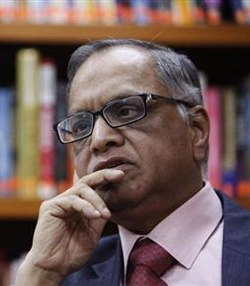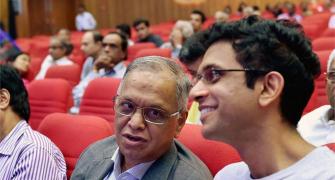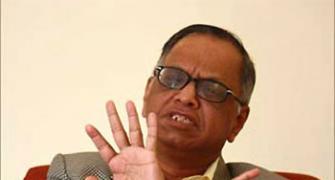 'There is a marked change in the enthusiasm, energy level, confidence and innovation orientation among youngsters.'
'There is a marked change in the enthusiasm, energy level, confidence and innovation orientation among youngsters.'
N R Narayana Murthy, below, left, co-founder and former chairman of information technology major Infosys, talks about the entrepreneurial system in India, steps taken to promote it and allied issues, in an interview with Bibhu Ranjan Mishra.
The Government of India is focusing big-time on things like Startup India, Skill India and taking the unbanked population into the banking system. Do you think all these will start paying dividends anytime soon?
All these started very well but it’s too early to say if it’s paying dividends.
These are all good ideas; we will have to have some patience. Push a bit longer and it would definitely pay.
However, certain things the young entrepreneurs must keep in India.
We must have high aspirations, we must work hard and must be disciplined, and learn to work in a team. We must benchmark ourselves against the best in the world.
How do you see the entrepreneurial system in India, especially as youngsters are starting companies with social objectives in mind?
There is a marked change in the enthusiasm, energy level, confidence and innovation orientation among youngsters.
I have been visiting the Development Dialogue by the Deshpande Foundation in Hubballi (former Hubli) every year and can clearly see these.
The impact of such initiatives can only be felt in the longer term.
While many organisations and semi-government bodies are involved in imparting skill development programmes, what should be the focus?
There are two levels at which we need these skills.
First, the ability of our children and youngsters to apply whatever they learn in the classrooms, to first understand the world.
Second, to make this world a better place for problem solving.
That requires very good quality teachers at the primary, secondary and higher education levels.
That’s one issue.
The second issue is even when you have youngsters who are reasonably educated at a basic level, you need to teach them skills, so that they can indeed be of value to society.
 Some of the organisations involved in providing skill-based training find the big diversity of India a challenge, despite customising the offerings. How can they overcome this?
Some of the organisations involved in providing skill-based training find the big diversity of India a challenge, despite customising the offerings. How can they overcome this?
The reality is there are poor people throughout the country.
This is leading to many other problems like illiteracy and malnutrition, while public health services are not adequate, no matter where you are.
So, the problems of different regions are the same.
Therefore, a course designed to train people and social entrepreneurs to address some of these problems in one part of the country will apply equally well to other parts and can be replicated.
Image: Designers at a BPO unit in Mumbai. Photograph: Punit Paranjpe/Reuters
The image is used for representational purpose only










